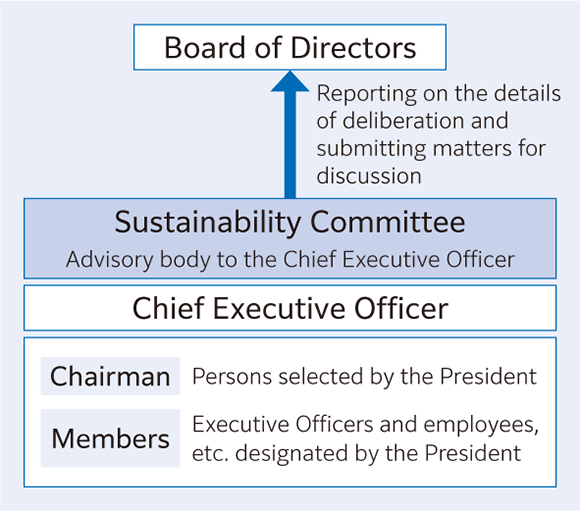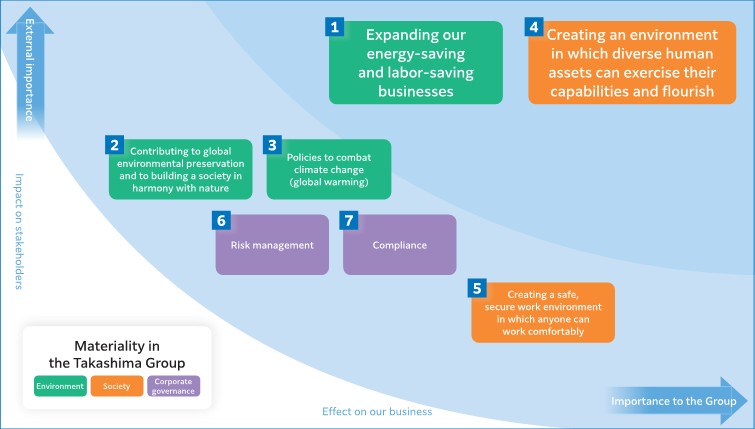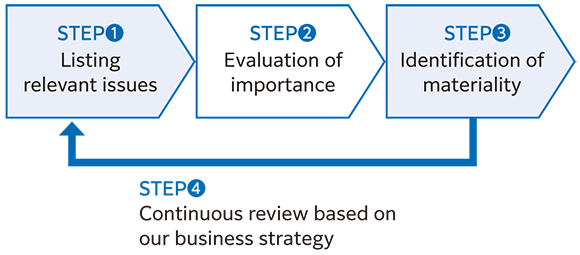The Takashima Group aims to achieve sustainable growth by generating a virtuous cycle of creating sustainable value and enhancing enterprise value, based on its Corporate Mission of “Contributing to Society through Our Business Activities.”
We develop and sell products that help give rise to a sustainable society, while also aiming to contribute to environmental preservation in part by reducing greenhouse gas emissions and efficiently using natural resources.
We strive to secure and strengthen human assets that are essential for achieving sustainable growth by improving employee job satisfaction and boosting employee engagement.
We seek to strengthen our corporate governance by engaging in transparent information disclosure and communications, while aiming to generate co-creation value with our stakeholders.
Since our establishment, the Group has advanced “Contributing to Society through Our Business Activities” as our Corporate Mission. For many years, we have conducted our business activities to contribute to society’s well-being by actively providing unique value-added solutions to our customers based on our original ideas and means, and with a desire to use those results to grow and prosper together.
With our Corporate Mission in mind, to promote sustainability initiatives, on January 1, 2022, we established the Sustainability Committee.

To promote sustainability at the Group, the Sustainability Committee deliberates items for evaluation including basic policy and targets to promote sustainability.
Seven materialities (important issues)
Since the founding of the Company, the Group has worked under the corporate mission of “Contributing to Society through Our Business Activities,” engaging in activities aimed at both achieving sustainable growth and helping to achieve a sustainable society.
Through the activities of the Sustainability Committee, which was established to enhance the Company’s sustainability initiatives, seven materialities (important issues) to be addressed by the Company were identified, based on assessments of their level of importance to society and their level of impact on the business. By addressing the seven materialities, we will continue to fulfill our corporate mission and work to enhance enterprise value.

Step❶ Listing relevant issues
We have listed relevant issues that consider the Group’s business environment and that refer to international frameworks and standards.
1) A long list was created based on the GRI Standards, SASB Standards, and key issues identified by international rating agencies.
2) From the long list, each item was scored in terms of “risks” and “opportunities” based on its level of importance as a business, its level of impact on the Company, and its level of importance to society and stakeholders.
3) As a result of the scoring, we regrouped 14 items with high scores that were identified as important issues for the Company and set them as the Company’s seven materialities.
Step❷ Evaluation of importance
Of the relevant issues identified, the Sustainability Committee has discussed and evaluated the importance for the “level of importance” to our stakeholders and society and the “level of effect” on the Company’s business.
Step❸ Identification of materiality
Items evaluated as having high importance are identified as materiality, and a plan for initiatives is being formulated while organizing and assigning priorities to the issues.
Step❹ Continuous review based on our business strategy
We conduct continuous evaluations in the event that materiality requires review while considering our business strategy.

Since the start of 2000, the Group has considered ourselves an advanced sustainability-focused trading company and positioned “energy saving,” “weight saving,” and “labor saving” as important fields, and these fields are now becoming the Company’s strengths.
We will continue to expand sales of renewable energy and clean energy related products (solar energy, storage batteries, electric vehicles, V2H) as well as energy-saving products (LED lights, zero-energy houses).
We are also proposing materials with a reduced environmental burden (reduced plastic) and making recycling proposals.
KPI: Percentage increase in sales of energy-saving and labor-saving products and services



In addition to complying with relevant environmental laws and regulations and ISO14001, we are promoting activities to reduce resource use in our business activities, mainly at our offices.
Furthermore, we see the removal from the supply chain due to delays in our response to environmental issues as a risk and are working to improve the status of our environmental management by confirming our customers’ demand levels and evaluating a sequential response.


In terms of our initiatives to combat climate change, we have plans to set targets linked to our next medium-term management plan. We will also perform continuous evaluations mainly at the Sustainability Committee, as we cooperate with all our stakeholders to realize a sustainable society.
KPI: Rate of reduction of greenhouse gas (GHG) emissions (Scope 1+2) [total for domestic business locations]


The Company positions the development of career human assets with management capabilities and expertise as an important issue, and in 2021 we fundamentally reformed our personnel system. Going forward, we will carry out reforms step by step by conducting job-class specific training sessions.
Additionally, we are evaluating initiatives to create a work environment in which diverse human assets including women, foreigners, and mid-career hires can flourish even more.
Moreover, we are moving forward with evaluations to prepare a human rights policy.
KPI: Participation rate in training, Ratio of foreign managers, Ratio of female managers

Because the Group’s most important resource is “people,” we believe that creating and maintaining a work environment in which anyone can comfortably work is an essential element in the Company’s growth. We are moving forward with the formulation of necessary policies to promote workers taking various leave, one of their rights, to promote the good health of our employees (reducing overtime and offering mental healthcare), and to establish a “Takashima general council of Safety and Health” particularly in business divisions that contract construction work.
Furthermore, by conducting regular surveys with our employees, the Company measures employee engagement and creates plans to carry out policies to increase engagement.
KPI: Ratio of employees on childcare leave returning to work, Paid leave utilization rate, Engagement survey score


Takashima is committed to “Integrity” at all times.
The credit that we have accumulated over many years is the foundation for the Group’s sustainable development thus far.To realize the Group’s Corporate Mission of “Contributing to Society through Our Business Activities,” all our employees constantly approach their business activities with our Corporate Value of “Integrity” as their basic premise, which has allowed us to build irreplaceable credit.
That said, impropriety such as compliance violations which do not align with our corporate value of “Integrity” greatly damage credit in the Company. Damage to the credit in the Group from society, our customers, and our employees means that the most important thing to the Group has been lost, not only short-term losses, but also large losses in the medium- to long-term. In creating “credit and trust,” the core of our business, legal and regulatory compliance is our highest priority. The Group has shared “compliance messages” and our “Anti-Monopoly Act Compliance Pledge” internally. In addition to stipulating and creating awareness about our “Basic Compliance Rules” and “Compliance Code of Conduct” as our behavioral guidelines, we have established the Compliance Committee as a promotional body as we work to strengthen our compliance system.

The Group has formulated rules for the appropriate management of risks that could have a serious impact on the Group’s business. Based on these rules, all departments are responsible for managing related risks in their respective division of duties, and all persons responsible for organizations including business groups are responsible for performing risk management in their respective organizations.
Furthermore, the Risk Management Committee performs comprehensive evaluations and deliberations on risks.
As a result of the evaluations, risks for which more focused policies are required are considered “important risk management items,” and both those policies and the status of initiatives are reported to the Board of Directors.
KPI: Participation rate in compliance training

Materiality KPIs
|
Materiality |
Key initiatives |
Main KPI |
Results (FY2022) |
Results (FY2023) |
Numerical targets/ Target year of achievement |
||
|
Environment |
Expanding our "energy saving” and “labor saving” businesses |
■ Growth in renewable energy-related businesses • Expand sales of solar panels, storage batteries, etc., to resolve energy-related issues ■ Expansion of labor-saving businesses • Expand sales of dry-type, pre-cut, and other functional products catering to the emerging labor saving needs |
Percentage increase in sales of energy-saving and labor-saving products and services*1 [Takashima & Co., Ltd.] |
[Reference year] |
14.1% increase |
130% increase |
FY2030 |
|
Contributing to global environmental preservation and to building a society in harmony with nature |
■ Compliance with ISO 14001 and disclosure of hazardous waste emissions, treatment costs, etc. ■ Promotion of responsible procurement of raw materials (e.g., supplier assessments, etc.) |
- |
- |
- |
- |
||
|
Policies to combat climate change (global warming) |
■ Promotion of reduction of greenhouse gas emissions through energy savings and renewable energy • Carry out further energy-saving activities • Promote introduction of renewable energy sources with a focus on solar power generation |
Rate of reduction of greenhouse gas (GHG) emissions (Scope 1+2)*2 [total for domestic business locations*3] |
[Reference year] (2,778.7 t-CO2) |
17.4% increase (3,263.99 t-CO2) |
35% reduction |
FY2030 |
|
|
Society |
Creating an environment in which diverse human assets can exercise their capabilities and flourish |
■ Development of human capital • Formulate and implement a medium- to long-term human assets management strategy • Further disclose results of investment in human assets, human productivity, etc. • Strengthen employee training (enhance training content, provide thorough training information, monitor training participation, and remind employees to participate in training) |
Participation rate in training*4 [Takashima & Co., Ltd.] |
83.5% |
93.6% |
100% |
Every year |
|
■ Promotion of diversity & inclusion • Promote recruitment and training of diverse human assets regardless of nationality and gender • Promote appointment of foreign managers • Promote sustainable career support for women • Establish a work environment and systems that allow women to work comfortably |
Ratio of foreign managers [consolidated] |
22.0% |
23.0% |
30% |
FY2025 |
||
|
Ratio of female officers [Takashima & Co., Ltd.] |
12.5% |
12.5% |
30% or more |
FY2030 |
|||
|
Ratio of female managers [consolidated] |
15.8% |
17.0% |
20% |
FY2025 |
|||
|
Creating a safe, secure work environment in which anyone can work comfortably |
■ Promotion of taking of childcare leave • Raise awareness of the childcare leave system and conduct further awareness-raising activities to encourage employees to take childcare leave • Establish a work environment and systems that allow employees to return to work easily |
Ratio of employees taking childcare leave [Takashima & Co., Ltd.] |
Male: 28.5% Female:100% |
Male: 57.1% Female:100% |
Male: 50% or more Female:100% |
FY2025 |
|
|
Ratio of employees on childcare leave returning to work*5 [Takashima & Co., Ltd.] |
Male: 100% Female: 100% |
Male: 100% Female: 100% |
Male: 100% Female: 100% |
Every year |
|||
|
■ Promotion of taking of paid leave • Promote various activities to encourage employees to take paid leave |
Paid leave utilization rate [Takashima & Co., Ltd.] |
63.3% |
72.9% |
70% or more |
Every year |
||
|
■ Improvement of employee engagement • Work to instill the Company's philosophy, strengthen coaching skills of managers, etc. |
Engagement survey score |
Takashima & Co., Ltd.: 45.3 |
Group-wide: 50.1 |
60 or higher |
FY2025 |
||
|
■ Maintenance and improvement of occupational health and safety management, occupational health services, etc. |
- |
- |
- |
- |
|||
|
Corporate governance |
Risk management system to prevent bribery and corruption |
■ Maintenance and improvement of compliance and risk management • Strengthen compliance training (enhance training content, provide thorough training information, monitor training participation, and remind employees to participate in training) |
Participation rate in compliance training [Takashima & Co., Ltd.] |
25.4%*5 |
93.1% |
100% |
Every year |
*1:Percentage increase in sales based on actual sales in FY2022
*2: Rate of reduction of emissions based on actual greenhouse gas (GHG) emissions in FY2022
*3: Results are the total for Takashima & Co., Ltd., on a non-consolidated basis and its seven domestic subsidiaries (Hi-Land Inc., iTak International (Japan) Co., Ltd., TAKCEL Co., Ltd., CLS Corporation, Rest Corporation, New Energy Distribution System Inc., and Takashima Robot Marketing Co., Ltd.)
The result for New Energy Distribution System Inc. is after joining the Group.
*4: Percentage of employees who have participated in mandatory training that is required for all employees (security training, harassment training, job class-specific training)
*5: Percentage of employees who planned to return to work following the completion of childcare leave in the previous fiscal year and are currently at the Company as of the end of the current fiscal year
*6: Participation in compliance training will be mandatory from FY2023
